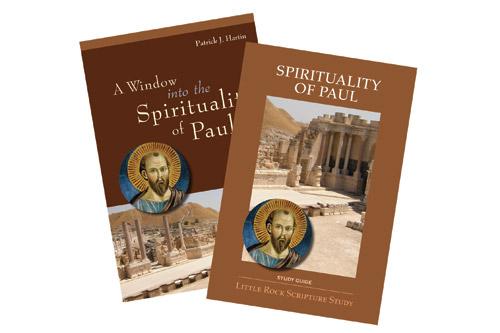
The newest program from Little Rock Scripture Study connects the spirituality of St. Paul to four figures in the Church.
“Spirituality of Paul” was released this month as an eight-session study with video wrap-up lectures, commentary and study guide.
The commentary was written by Father Patrick J. Hartin of Gonzaga University in Washington, who also wrote a similar commentary for the LRSS study called “Spirituality of the Gospels.”
“He highlighted in the commentary different aspects of Paul’s spiritualty that comes through in his letters,” said LRSS director Cackie Upchurch. “It is not just a study of Romans or a study of Philippians, but some of the major themes that come out of Paul’s correspondence.”
Father Hartin illustrates the apostle’s spirituality by relating it to four Catholic figures, including St. Kateri Tekakwitha, the late Mother Antonia Brenner, the late Father Stanley Rother and St. Katharine Drexel.
“The people who use this will get a real sense of who Paul is,” she said.
Upchurch admitted that some Catholics might have the wrong impression about St. Paul, and this study might help clear up some misconceptions.
“For example, I think he gets a bad rap about the wrong things,” she said. “A lot of times people think he was hard on women or sexist. In reality, it depended on the particular community he was writing to. When he was writing to Romans, he greets the women leaders there. Lydia of Philippi is one of the leaders of the Church that he works with. … It’s not fair to Paul and it’s not fair to history … I don’t think he could ever be accused of being humble. On the other hand, his life was so transformed and he had such passion and conviction for what he wanted to communicate with people. ... His impact in Christian history is probably second only to Jesus and Mary.”
Upchurch said St. Paul wrote his letters over a period of 11 to 13 years and those who study his letters can see his theology transform over the years. He had his conversion in A.D. 34, was a missionary from 37 to 51, wrote his first letter to the Thessalonians in 50 or 51 and was executed around 62 to 64.
“You really see a progression because he was experiencing more Christian life,” she said.
The LRSS staff also released a study program on Jeremiah in June. The 11-session study includes a commentary by Dr. Pauline Viviano of Loyola University in Chicago.
“When you hear the word prophet you might think of a future-seer or soothsayer,” Upchurch said. “We try to help those who study the prophets to recognize that the original context was a historical situation where they were searching for God’s presence, and the prophet speaks on behalf of God to try to get them to return to the covenant. The prophet is spelling out ‘here is the future for you if you don’t get back to the covenant and here is the future for you if you do’.”
Upchurch said a study of Jeremiah can aid modern-day Catholics who struggle with uncertainty.
“They get a sense of the turmoil that people felt (during the Babylonian exile in the sixth century B.C.) and why they felt God abandoned them,” she said. “Why was there such evil in the world? Why did they lose everything? On that level, people should be able to relate. We see things in our world that we just don’t understand and wonder why isn’t God intervening and coming to the rescue like a super hero. The prophet tries to help you see that you have a stake in this too and your return to the covenant will have a consequence and that consequence will be to recognize where God is.”
Upchurch said LRSS will be observing National Bible Week Nov. 15-21. The U.S. observance has been resurrected after a lapse of many years. A reading guide was written by associate director Cliff Yeary based on this year’s theme “The Bible: A Book for the Family.” The seven-day guide is available at littlerockscripture.org.
Please read our Comments Policy before posting.
Article comments powered by Disqus 'Cabrini' film tells story of saint with great faith
'Cabrini' film tells story of saint with great faith
 Rogers church venerates saints with 14 custom portraits
Rogers church venerates saints with 14 custom portraits
 10 saints who can bring us close to the Eucharist
10 saints who can bring us close to the Eucharist
 Liturgical artist crafts customized wooden Easter eggs
Liturgical artist crafts customized wooden Easter eggs
 St. Stephen, a hero of The Grateful Dead?
St. Stephen, a hero of The Grateful Dead?
 Don’t let misconceptions cause faith to waver
Don’t let misconceptions cause faith to waver
 Seniors, whatever storms may come, Jesus will be there
Seniors, whatever storms may come, Jesus will be there
 Studio 3:16 offers new approach to teaching religion
Studio 3:16 offers new approach to teaching religion
 After three decades, NLR principal plans to retire
After three decades, NLR principal plans to retire
 CHS athlete overcomes odds to reach collegiate goal
CHS athlete overcomes odds to reach collegiate goal
 St. Joseph a model of solidarity with immigrants
St. Joseph a model of solidarity with immigrants
 Two gifts after Jesus’ death: Virgin Mary and Eucharist
Two gifts after Jesus’ death: Virgin Mary and Eucharist
 Why we have an altar, and not just a communion table
Why we have an altar, and not just a communion table
 Pope: Wars should be resolved through nonviolence
Pope: Wars should be resolved through nonviolence
 Living relationship with Jesus Christ in the Eucharist
Living relationship with Jesus Christ in the Eucharist